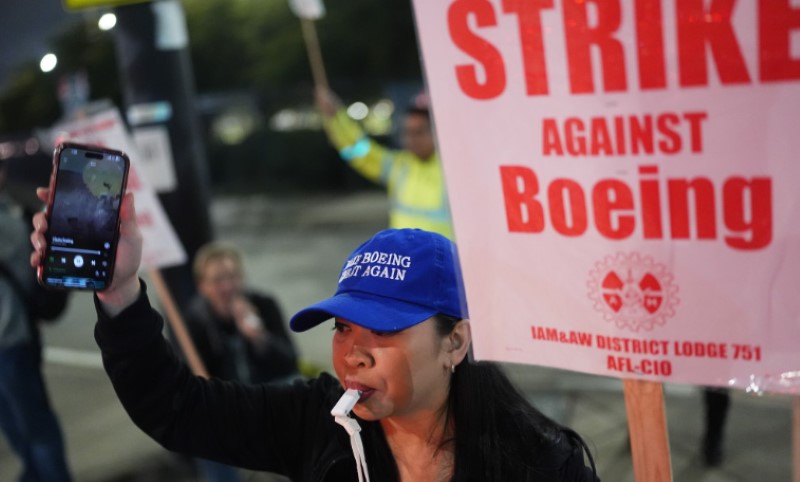Some 33,000 union members at Boeing Co. began a strike on Friday, Sept. 13, after they overwhelmingly rejected a four-year contract with the embattled aircraft maker. It is Boeing’s first strike in 16 years and will lead to a near-total shutdown of commercial airplane production at one of the nation’s largest manufacturing giants and biggest exporters, with potential repercussions for the U.S. economy. The duration of the strike could affect the operations of nearly 10,000 Boeing suppliers in all 50 U.S. states.
Boeing union members strike after rejecting contract offer
Boeing employs about 150,000 people in the U.S., contributes an estimated $79 billion annually to the U.S. economy, and provides 1.6 million jobs directly and indirectly. The rejected contract proposal, which the International Association of Machinists (IAM) union leadership called the “best-ever” agreement negotiated with Boeing, provided at least a 25 percent raise over the life of the contract. The agreement also improves job security for union members because Boeing has committed to producing its next commercial airplane at a unionized plant at a date yet to be announced. If the contract did not contain this clause, Boeing might have chosen to build the plane at a non-unionized plant.
However, 95 percent of IAM union members voted against the agreement. In a separate vote, 96 percent of members voted in favor of the strike, easily exceeding the two-thirds threshold needed to authorize a strike. The strike officially begins at 11:59 p.m. (Pacific Time) on Thursday, Sept. 12, which is Friday, Sept. 13, at 2:59 a.m. (Eastern Time). In announcing the vote, Jon Holden, president of Boeing IAM’s largest local union, said, “This is a fight for our future. We will return to the bargaining table wherever possible to advance the issues our members believe are important.” Boeing has also signaled its willingness to return to the negotiating table to seek a new deal. In a statement, the company said, “Our message is clear that the initial agreement we reached with IAM leadership is unacceptable to the membership. We remain committed to realigning our relationship with our employees and the union.”
Employee dissatisfaction stemming from long-standing issues

Boeing’s past concessions, along with a host of issues, including layoffs and the transfer of some jobs from a unionized assembly plant to one of the company’s non-unionized plants, have stoked widespread employee dissatisfaction with the company. As a result, a vote against the contract was still expected, despite some of the concessions included in the buyout offer.
Jim Bloomer, a Boeing employee of 28 years, said in an interview at the strike line outside the Renton, Washington, plant, “For many of us, this has been a long time in the making. The fact is, we deserve more reward for our work. If Boeing claims we are the best in the industry, then they need to treat us like the best in the industry. Considering an airplane is worth $180 million, the percentage of labor costs is insignificant.” The plant produces 737 Max airplanes. Brummer also said he and the other strikers have saved enough money for a prolonged strike. “We’ve been anticipating this day for years. The warnings have been evident for a long time. We are being treated unfairly and they are taking more than they are giving us.”
Earlier this week, new Boeing CEO Kelly Ortberg acknowledged that employees were unhappy with past contract terms, but he urged union members to put aside past grievances and vote for the deal. “I know the tentative agreement we reached with the IAM has generated a strong response. I understand and respect that enthusiasm, but I ask that we don’t let past frustrations deter us from securing a future together.” In his first week on the job, Ortberg said he wanted to “rebuild our relationship with the union.” While Holden told CNN late last month that he hadn’t seen any change in negotiating tactics since Ortberg took office, he said Thursday night, Sept. 12, that he didn’t necessarily blame the strike on the company’s new leadership. “It’s really hard to make up for 16 years of problems, and that’s really what the leadership of the company has done to our members for almost 20 years.”
Boeing’s financial and safety troubles in recent years

Despite its ongoing problems, Boeing remains an important part of the U.S. economy. This strike is just the latest blow the company has faced. Over the past five years, Boeing has experienced a myriad of problems, including some tragic events and many embarrassing situations, most of which have taken a heavy toll financially.
Its best-selling airplane, the 737 Max, suffered two fatal accidents in October 2018 and March 2019 that killed a total of 346 people and led to the model being grounded for 20 months to fix design flaws related to the accidents. Since then, Boeing has faced a series of questions about the quality and safety of its airplanes, which were further exacerbated when a hatch plug exploded on January 5, 2023, shortly after takeoff of an Alaska Airlines 737 Max, according to the latest report. While the incident did not result in fatalities or serious injuries, it triggered several federal investigations, one of which found that the airplane left the Boeing plant missing the four bolts needed to secure the door plug in place.
Subsequently, Boeing agreed to plead guilty to federal criminal charges that it defrauded the Federal Aviation Administration during its preliminary investigation of the 737 Max. As part of its agreement with the U.S. Department of Justice, the company must operate under the supervision of a court-appointed monitor. The strike will not affect consumer travel, and Boeing airplanes that have been delivered to airlines and are being used worldwide will continue to operate normally. However, the strike will result in delays in deliveries of airplanes promised to airlines, cutting off Boeing’s main source of cash flow.
However, Boeing has not achieved annual profitability since 2018, and as of the second quarter of this year, its cumulative core operating loss has exceeded $33 billion, and its credit rating has been downgraded to near “junk” status. Even before the strike, the company was not expected to return to profitability anytime soon due to production constraints, and Boeing stock opened down 2% in regular trading on Friday, September 13th. Boeing shares have fallen more than 60% in the past five years, and more than 30% since the Alaska Airlines incident at the beginning of the year.












